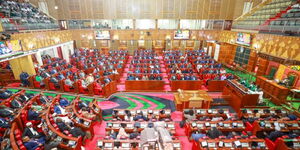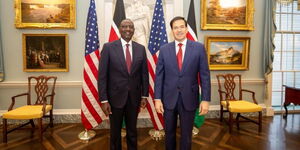Kenyans seeking jobs in the United States have been granted a new olive branch, after the government and the State of Nebraska entered into a labour migration agreement this week.
Speaking on Wednesday, Bob Evnen, the Nebraska Secretary of State, said that the midwestern state is already in the process of hiring truck drivers, with intentions to expand recruitment efforts to include nursing and other medical professions.
He stated, “We have commercial truck drivers already who are being trained, partially in Kenya, and then they complete their training in Nebraska.” This initiative is in direct response to the pressing shortage of commercial drivers in the United States, particularly those operating tractor-trailer combinations.
The Memorandum of Understanding (MoU) was signed on Tuesday at the State House in Nairobi and witnessed by President William Ruto. The agreement was formalised by Diaspora Principal Secretary Roseline Njogu and Evnen, marking a significant step forward in fostering bilateral relations between Kenya and Nebraska.
In a statement made the day after the MoU was signed, Evnen praised the remarkable qualities of Kenyans, attributing their strong work ethic and dedication as key factors in the decision to establish this agreement.
He said, “Kenyans are hard-working, they're dedicated, and they're very sharp. This makes working with the Kenyan government and the Kenyan people both desirable and rewarding for us.”
PS Njogu echoed these sentiments, emphasising that this deal will create vital job opportunities for Kenyans during a time when the United States is experiencing a crackdown on migration.
“This labour mobility and diaspora support MoU we signed yesterday will see Kenyan talent take up opportunities in Nebraska, supporting shortages in critical sectors and deepening the ties between Kenya, Nebraska and the US in general,” she affirmed.
The agreement promises to protect Kenyans seeking jobs in a state located 13,350 kilometres from Nairobi, providing them with a structured pathway to employment. The timing of this deal is particularly critical, given the heightened scrutiny and enforcement measures introduced by the Trump administration regarding immigration.
The Trump administration has implemented sweeping restrictions, including tightening visa programmes and increasing enforcement at the southern border, aimed at deterring both legal and irregular immigration.
Such measures, which encompass slashing refugee admissions and narrowing eligibility for work permits, have caused considerable concern among industries that rely heavily on foreign workers.
Employers across various sectors, including agriculture, construction, and healthcare, have warned that the ongoing squeeze on migration is leading to significant labour shortages, which in turn threaten productivity and escalate operational costs.
Despite these challenges, Evnen expressed optimism about the future of the agreement and the potential it holds for Kenyans.
“We have a commission now, a committee that has established a process under which we can explore further labour mobility fields, one of which could be the medical field and nursing, and there are other fields as well where we'll be able to expand our relationship in this way,” he stated.












